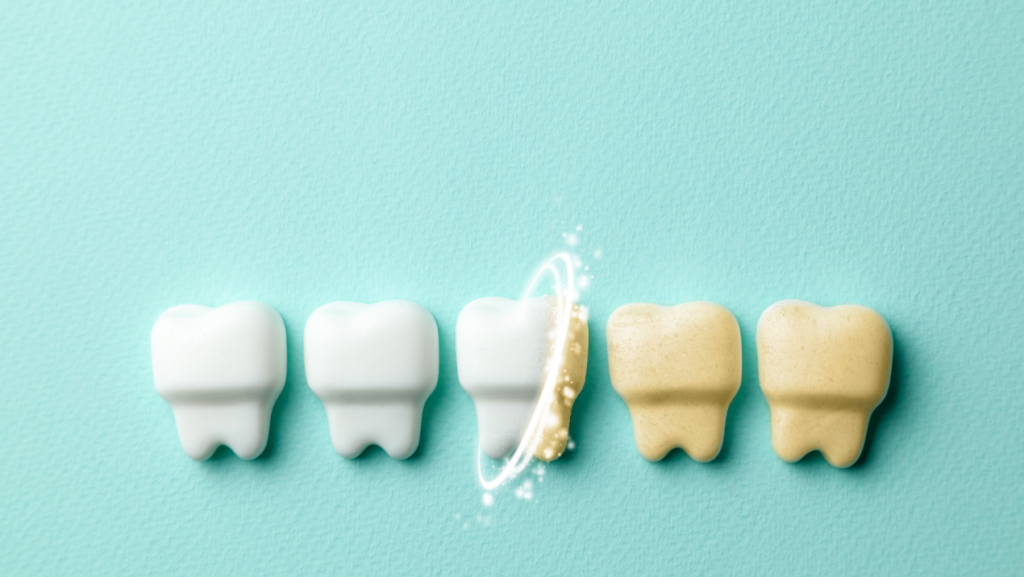6 Types of Teeth Whitening:
Teeth whitening is a popular cosmetic dentistry treatment that aims to lighten the color of teeth to make them appear whiter and brighter. There are various methods and products available for teeth whitening, but it’s important to note that the effectiveness and safety of these methods can vary.
Here are some common approaches.
1. Professional Brightening:
This is usually the most effective and fastest way to whiten your teeth. This is done by a dentist or dental hygienist. They apply a highly concentrated whitening gel to your teeth and often use a particular light or laser to activate the brightening process. Results are usually visible after a single session, but multiple sessions may be required for optimal results.
2. Teeth Whitening Kits:
Dentists can provide you with customized whitening trays and a lower-concentration whitening gel for your home use. This method may take longer to achieve the desired results compared to in-office treatments but is still effective.
3. Brightening Products:
These include whitening toothpaste, whitening strips, and whitening gels that can be purchased without a prescription. Although they can help somewhat, they often have lower concentrations of brightening agents, so results may be less dramatic and last longer.
4. Natural Remedies:
Some people try natural methods to whiten their teeth such as baking soda, hydrogen peroxide, activated charcoal, or oil. These approaches may have limited effectiveness and may damage tooth enamel if used excessively or incorrectly.
5. Changes in Lifestyle:
Avoiding certain foods and beverages that stain teeth, such as coffee, tea, red wine, and tobacco, can help prevent further staining. Maintaining good oral hygiene practices like regular brushing and flossing is also important.
6. Porcelain Veneers:
In cases where teeth are severely discolored and other whitening methods to brighten the teeth are ineffective, porcelain veneers may be an option. These are thin shells of porcelain that are custom-made to cover the front surfaces of teeth, providing a permanently white appearance.
It’s important to consult with a dentist before undergoing any treatment, especially if you have underlying dental issues, such as cavities, gum disease, or tooth sensitivity. They can assess your oral health, discuss the best whitening options for you, and provide guidance on maintenance to ensure long-lasting results.
Additionally, keep in mind that teeth whitening results are not permanent, and the duration of the effects can vary based on your lifestyle and dietary habits. Regular touch-ups may be necessary to maintain your desired level of brightness.
FAQS:
1. How does teeth whitening work?
Typically involves the use of bleaching agents, such as hydrogen peroxide or carbamide peroxide, which break down stains and discolorations on the enamel. These agents penetrate the enamel to whiten the dentin underneath, resulting in a brighter smile.
2. Is teeth whitening safe?
It is generally safe when performed under the guidance of a dental professional. Over-the-counter products and home remedies should be used cautiously and as directed to prevent potential side effects like tooth sensitivity and gum irritation.
3. How long does teeth whitening last?
The results can vary from person to person. Factors such as diet, oral hygiene, and lifestyle choices (like smoking or drinking staining beverages) can influence how long the effects last. Typically, whitening effects can last from several months to a few years.
4. Are there any side effects of whitening your teeth?
Common side effects may include tooth sensitivity and gum irritation. These effects are usually temporary and can be managed with desensitizing toothpaste or gels. Professional dental supervision can help minimize the risk of side effects.
5. Can anyone get their teeth whitened?
While it is generally safe for most people, it may not be suitable for individuals with certain dental conditions, allergies to whitening agents, or during pregnancy. It’s important to consult with a dentist to determine if the procedure is appropriate for your specific circumstances.
6. How white can my teeth get with whitening?
The degree of whitening achievable depends on several factors, including the starting color of your teeth and the method of whitening used. Professional treatments tend to yield more noticeable results than over-the-counter products.
7. What is the difference between in-office and at-home teeth whitening?
In-office whitening is performed by a dentist or dental hygienist and usually produces faster and more dramatic results. At-home whitening typically involves custom trays and a lower-concentration bleaching gel provided by a dentist. At-home methods take longer but can be more convenient.
8. Are there any foods or drinks to avoid after whitening your teeth?
It’s best to avoid dark-colored or staining foods and beverages like coffee, tea, red wine, and berries for a few days. Smoking should also be avoided as it can lead to staining.
9. How much does this cost?
The cost can vary widely depending on the method and location. In-office professional treatments are typically more expensive than at-home options. Dental insurance typically does not cover cosmetic teeth whitening.
10. Can teeth whitening damage tooth enamel?
When used as directed by a dental professional, the products should not damage tooth enamel. However, overusing or misusing whitening products can lead to enamel erosion, so it’s important to follow instructions carefully.
Always consult with a dentist before undergoing any procedure to ensure it is safe and suitable for your specific needs and to address any concerns or questions you may have about the process.


